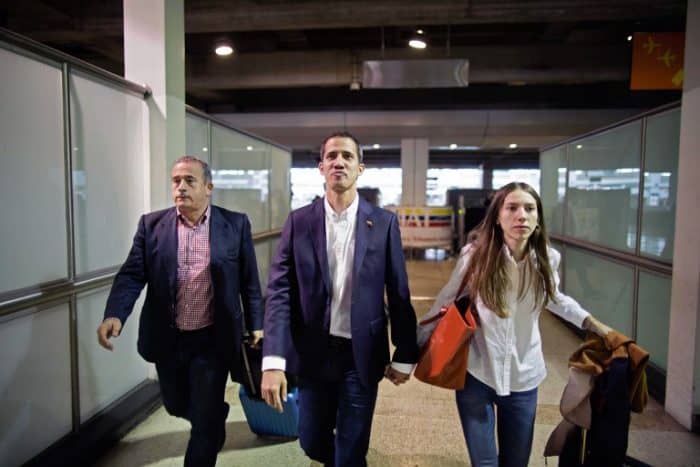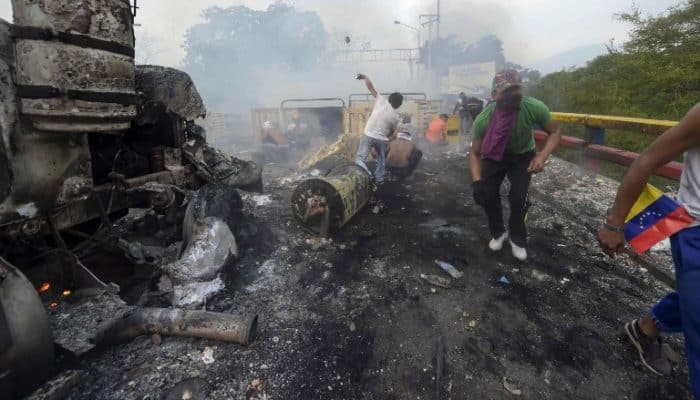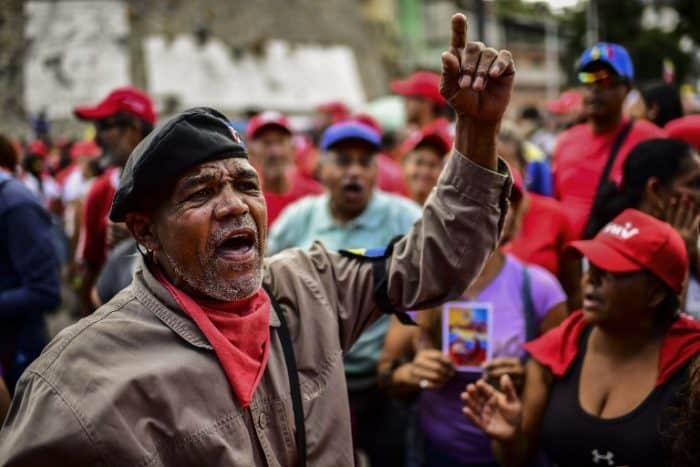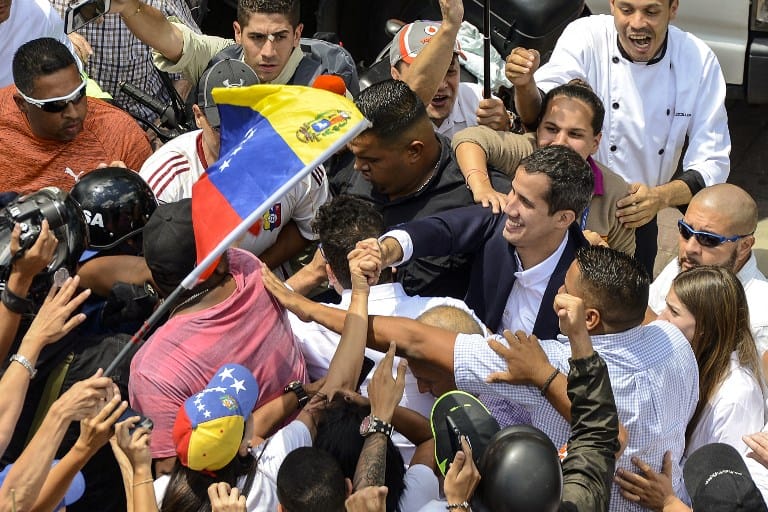Venezuela’s opposition leader Juan Guaidó was cheered by thousands of flag-waving supporters chanting “Yes, you can!” as he returned to Caracas on Monday, defying the threat of arrest by embattled President Nicolás Maduro’s regime.
“We know the risks we face, that’s never stopped us. The regime, the dictatorship must understand,” Guaidó told the crowd.
“We’re stronger than ever, let’s carry on in the streets, mobilized.”
Just before his arrival, U.S. Vice President Mike Pence sent a warning to Maduro to ensure Guaidó’s safety.
“Any threats, violence, or intimidation against him will not be tolerated & will be met with swift response,” Pence wrote on Twitter.
Supporters, media and the ambassadors of allied countries mobbed Guaidó on his arrival at the international airport in Caracas before he headed into the city and a tumultuous homecoming by thousands of supporters.
There, the self-declared acting president announced a new protest march for Saturday to ramp up the pressure on Maduro.
“All of Venezuela will return to the streets. We will not rest one second until freedom is achieved,” said Guaidó, recognized as interim president by more than 50 countries.
Venezuelans holding aloft flags, crosses and portraits of their young leader chanted: “Guaidó! Guaidó!” and “Yes you can!”
Before returning he had warned Maduro against trying to detain him, saying it would be “one of the last mistakes” he would make.

Direct challenge
Guaidó left Venezuela 10 days ago in an unsuccessful bid to force through desperately needed humanitarian aid stockpiled in Colombia.
He then went on a tour of regional allies Colombia, Brazil, Argentina, Paraguay and Ecuador.
Guaidó ‘s reappearance in Venezuela poses a direct challenge to socialist Maduro, who had said the opposition leader would face justice when he returned.
Maduro must decide whether to arrest Guaidó for defying a travel ban — thereby provoking strong international condemnation — or allow him to enter unmolested, which would undermine his own authority, analysts say.
When he left Venezuela on February 23, Guaidó said the military had helped him cross the border into Colombia, even though he was under a travel ban.
The high command has professed absolute loyalty to Maduro, however, and troops have blockaded border crossing to prevent the entry of humanitarian aid, supplied mostly by the United States.
Guaidó has said some 300,000 people are at risk of death without those supplies of food and medicine.
Venezuela is in the midst of economic upheaval after four years of recession that have plunged many into poverty.

Hyperinflation has obliterated salaries and savings, while 2.7 million people have fled the country since 2015, according to a UN estimate.
Guaidó, who heads the opposition-led National Assembly, stunned the world on Jan. 23 when he proclaimed himself Venezuela’s acting president.
He acted after the legislature declared Maduro a usurper and illegitimate over his May 2017 re-election, which was widely criticized as fraudulent. Maduro’s new term in office began on January 10.
Guaidó wants to oust Maduro, set up a transitional government and call new elections.
He says he has not ruled out any measures to achieve that aim, while U.S. President Donald Trump has repeated that “all options are on the table.”
Guaidó must “now look for an idea around which to maintain hope,” Felix Seijas, an academic and director of Delphos pollsters, told AFP.
“He has to make the moves that will keep the international community from taking more radical action like an intervention.”
‘Maduro at permanent risk’

Maduro enjoys strong support from Russia, which accuses Washington of interventionism, and China, which is concerned over the fate of billions of dollars in loans to Maduro’s regime.
The socialist president warned last week that Guaidó should “respect the law” and would have to “face justice” upon his return.
European Union foreign policy chief Federica Mogherini warned Maduro on Saturday that detaining Guaidó would incur “a major escalation of tensions.”
“Guaidó has grown so much politically that they haven’t been able to touch him, in the traditional ways… which is to put him in prison or force him to flee the country, harass him,” said political analyst Luis Salamanca.
Separately, Chile’s President Sebastian Pinera sharply criticized UN rights commissioner Michelle Bachelet — Chile’s president from 2006-2010 and 2014-2018 — on Sunday for failing to condemn Maduro for human rights violations.
This story was made possible thanks to The Tico Times 5 % Club. If only 5 percent our readers donated at least $2 a month, we’d have our operating costs covered and could focus on bringing you more original reporting from around Costa Rica. We work hard to keep our reporting independent and groundbreaking, but we can only do it with your help. Join The Tico Times 5% Club and help make stories like this one possible.






